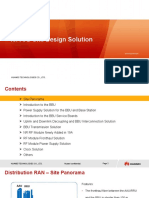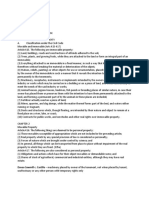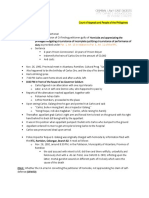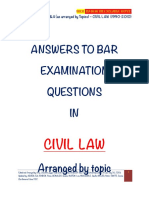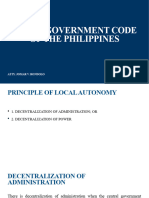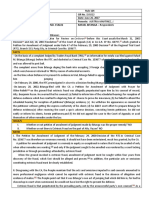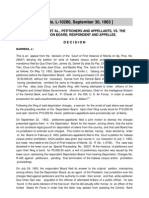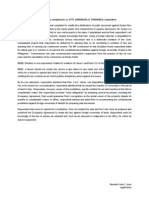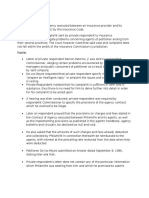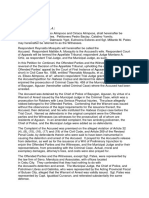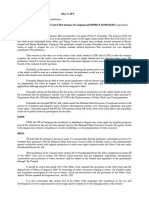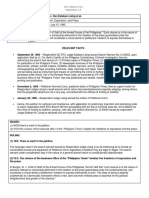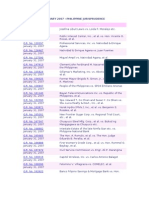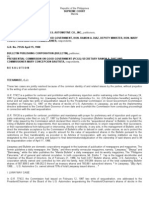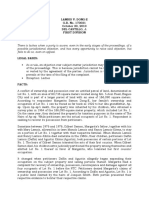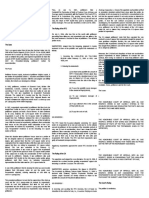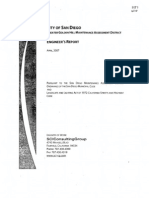Codal Notes
Codal Notes
Uploaded by
liboaninoCopyright:
Available Formats
Codal Notes
Codal Notes
Uploaded by
liboaninoCopyright
Available Formats
Share this document
Did you find this document useful?
Is this content inappropriate?
Copyright:
Available Formats
Codal Notes
Codal Notes
Uploaded by
liboaninoCopyright:
Available Formats
Law on Waters 1. PD 1067: The Water Code = promulgated on December 31, 1976 2.
Before PD 1067: the governing laws on waters are: i. Civil Code: Art. 502-518 ii. Supplementary laws: Special Law of Waters of August 3, 19866 and Irrigation Law 3. Clean Water Act = tackles pollution, rather than ownership Art. 4 of PD 1067: Waters, as used in this Code, refers to water under the groun ds, water above the ground, water in the atmosphere and the waters of the sea wi thin the territorial jurisdiction of the Philippines Sec 2 Art XII of the Constitution: All lands of the public domain, waters, miner als, coal, petroleum, and other mineral oils, all forces of potential energy, fi sheries, forests or timber, wildlife, flora and fauna, and other natural resourc es are owned by the State. With the exception of agricultural lands, all other n atural resources shall not be alienated. The exploration, development, and utili zation of natural resources shall be under the full control and supervision of t he State. The State may directly undertake such activities, or it may enter into co-production, joint venture, or production-sharing agreements with Filipino ci tizens, or corporations or associations at least sixty per centum of whose capit al is owned by such citizens. Such agreements may be for a period not exceeding twenty-five years, renewable for not more than twenty-five years, and under such terms and conditions as may be provided by law. In cases of water rights for ir rigation, water supply, fisheries, or industrial uses other than the development of water power, beneficial use may be the measure and limit of the grant. The State shall protect the nation's marine wealth in its archipelagic waters, t erritorial sea, and exclusive economic zone, and reserve its use and enjoyment e xclusively to Filipino citizens. The Congress may, by law, allow small-scale utilization of natural resources by Filipino citizens, as well as cooperative fish farming, with priority to subsist ence fishermen and fishworkers in rivers, lakes, bays, and lagoons. The President may enter into agreements with foreign-owned corporations involvin g either technical of financial assistance for large-scale exploration, developm ent, and utilization of minerals, petroleum, and other mineral oils according to the general terms and conditions provided by law, based on real contributions t o the economic growth and general welfare of the country. In such agreements, th e State shall promote the development and use of local scientific and technical resources. The President shall notify the Congress of every contract entered into in accord ance with this provision, within thirty days from its execution. Qualified to apply: Art. 15 of PD 1067: Only citizens of the Philippines, of legal age, as well as j uridical persons, who are duly qualified by law to exploit and develop water res ources, may apply for water permits. (only Filipino citizens and corporations) Term of Permit: Art. 28 of PD 1067: Water permits shall continue to be valid as long as wate r is beneficially used; however, it maybe suspended on the grounds of non-compli ance with approved plans and specifications or schedules of water distribution; use of water for a purpose other than that for which it was granted; non-payment of water charges; wastage; failure to keep records of water diversion, when req uired; and violation of any term or condition of any permit or rules and regulat ions promulgated by the Council. Temporary permits may be issued for the appropriation and use of water f or short periods under special circumstances. (Maximum period is the beneficial used of water) Office in charge:
National Water Resources Board (NWRB) = formerly Nat l Water Resources Council * created by PD 424 in March 28, 1974 * conferred with regulatory and executory powers, such as to coordinate and inte grate water resources development activities of the country as well as to determ ine, adjudicate and grant water rights, for which purpose it may issue needful r ules and regulations * also functions as advisory to the NEDA, recommending the adoption of general p olicies and guidelines, including plans and programs for water resources develop ment BF Northwest Homeowners Assn. vs. IAC [G.R. No. L-72370. May 29, 1987.] F: NWRC approved water rates allowing BF Homes, Inc. to charge higher rates to i ts customers. Petitioner appealed NWRC decision to RTC which dismissed the appea l saying it has no jurisdiction H: RTC has jurisdiction since NWRC is ranked with inferior courts The National Water Resources Council (NWRC) was was vested with the general powe r to coordinate and integrate water resources development, and among others, to formulate and promulgate rules and regulations for the exploitation and optimum utilization of water resources, including the imposition on water appropriators of such fees or charges as may be deemed necessary by the Council for water reso urces development. Plainly, the NWRC is ranked with "inferior courts," MTC, MTCC, etc. Expl icit as well is the proviso that NWRC decisions on water rights controversies ar e appealable to the Court of First Instance (now RTC) The logical conclusion, therefore, is that jurisdiction over actions for annulment of NWRC decisions lies with the Regional Trial Courts, particularly, when we take note of the fact that the appellate jurisdiction of the Regional Tr ial Court over NWRC decisions covers such broad and all embracing grounds as gra ve abuse of discretion, questions of law, and questions of fact and law (Art. 89 , P.D. No. 1067). This conclusion is also in keeping with the Judiciary Reorgani zation Act of 1980, which vests Regional Trial Courts with original jurisdiction to issue writs of certiorari, prohibition, mandamus, etc. (Sec. 21 [1], B.P. Bl g. 129) relating to acts or omissions of an inferior Court (Sec. 4, Rule 65, Rul es of Court). Abe-Abe v. Manta [G.R. No. L-4827. May 31, 1979.] F: Upstream farmers want to stop Atty. Romualdo from using the water of the cree ks at night to irrigate his two-hectare rice land located downstream. Farmers fi led a case before the courts H: lower court has no jurisdiction; NWRC has We hold that the petition is devoid of merit. It is incontestable that the petit ioners' immediate recourse is to ventilate their grievance with the National Wat er Resources Council which, as already noted is the administrative agency exclus ively vested with original jurisdiction to settle water rights disputes under th e Water Code and under PD No. 424. That jurisdiction of the Council under section 2(b) of Presidential Decr ee No. 424 is reaffirmed in section 88 of the Water Code and in section 3(d) the reof which provides that "the utilization, exploitation, development, conservati on and protection of water resources shall be subject to the control and regulat ion of the government through" the Council. Sec 2 of Art XII of the Const: * no specific class of waters, only specific uses * irrigation, supply, fisheries, power, industrial uses BUT Art. 10 of PD 1067 provides for uses of waters: 1.) domestic purposes = utilization of water for drinking, washing, bathing, coo king or other household needs, home gardens, and watering of lawns or domestic a nimals. 2.) municipal purposes = utilization of water for supplying the water requiremen
ts of the community. a) Use of water for irrigation is the utilization of water for p roducing agricultural crops. 3.) power generation = utilization of water for producing electrical or mechanic al power. 4.) fisheries = utilization of water for the propagation and culture of fish as a commercial enterprise. 5.) livestock raising = utilization of water for large herds or flocks of animal s raised as a commercial enterprise. 6.) industrial purposes = utilization of water in factories, industrial plants a nd mines, including the use of water as an ingredient of a finished product. 7.) recreational purposes = utilization of water for swimming pools, bath houses , boating, water skiing, golf courses and other similar facilities in resorts an d other places of recreation. Is Water immovable or movable property? * Water is IMMOVABLE because in its natural state it is regarded as forming part of the land * Water is also MOVABLE because it is part of the forces of nature which is brou ght under the control of science US vs. Tambunting [G.R. No. 16513. January 18, 1921.] F: Tambunting used gas without the knowledge of the gas company. He was charged with theft H: he is guilty of theft since gas is considered as personal property The clandestine subtraction and appropriation of gas, without the consen t of the owner constitutes theft. Electric energy could be the subject of theft . There is nothing in the nature of gas used for illumination purposes which re nders it incapable of being feloniously taken and carried away. It is a valuabl e article of merchandise, bought and sold like other personal property, suscepti ble of being severed from a mass or larger quantity and of being transported fro m place to place. Likewise, water which is confined in pipes and electricity wh ich is conveyed by wires are subjects of larceny. * Art 502 of the CC: enumerates what belongs to the State. This is the same with Art 5 of PD 1067. * Art 503 of the CC: water subject to private ownership. This was not carried ov er in PD 1067 * Implication: water belongs to the state, whether found in public or private la nd. Water cannot be of private ownership. Only the use of such water, not owners hip is granted in administrative concession. * So, you cannot drill a well without prior permit Priority over use of waters: Art. 95 of PD 1067: Within two (2) years from the promulgation of this Code, all claims for a right to use water existing on or before December 31, 1974 shall b e registered with the Council which shall confirm said rights in accordance with the provisions of this Code, and shall set their respective priorities. casia When priority in time of appropriation from a certain source of supply c annot be determined, the order of preference in the use of the waters shall be a s follows: a.Domestic and municipal use e.Livestock raising b.Irrigation f.Industrial use, and c.Power generation g.Other uses. d.Fisheries Any claim not registered within said period shall be considered waived a nd the use of the water deemed abandoned, and the water shall thereupon be avail able for disposition as unappropriated waters in accordance with the provisions of this Code.
* This comes into play if there are two conflicting rights * constitution does not establish a rule of priority, it only mentions the uses for which the water right is granted * CC; also no provision on use; only provided for the manner on how use of water may be acquired * PD 1067 repealed Civil Code
You might also like
- Summary of The Water Code of The PhilippinesDocument7 pagesSummary of The Water Code of The PhilippinesVanessa Sanchez88% (8)
- 19A 5G Site Design SolutionDocument93 pages19A 5G Site Design Solutionmuhieddine alqousi0% (1)
- A. Movable and Immovable PropertyDocument2 pagesA. Movable and Immovable PropertyhectorjrNo ratings yet
- Property CasesDocument1 pageProperty CasesdorianNo ratings yet
- Galang v. CADocument4 pagesGalang v. CAJulius ReyesNo ratings yet
- Intellectual Property Rights in The Philippines Brief BackgroundDocument30 pagesIntellectual Property Rights in The Philippines Brief BackgroundSushenSisonNo ratings yet
- Civil Law Suggested Answers (1990-2010)Document205 pagesCivil Law Suggested Answers (1990-2010)Geleen MaeNo ratings yet
- LGC-PPT 1Document47 pagesLGC-PPT 1Nicole ChingNo ratings yet
- Conflicting DecisionDocument2 pagesConflicting Decisionlucky javellanaNo ratings yet
- Bpi Vs Eduardo HongDocument5 pagesBpi Vs Eduardo HongLance KerwinNo ratings yet
- 8 - People Vs BitangaDocument2 pages8 - People Vs BitangaColenNo ratings yet
- IP Notes Based On SyllabusDocument28 pagesIP Notes Based On SyllabusMary CatchillarNo ratings yet
- Qua Chee Gan v. The Deportation Board G.R. No. L-10280, September 30, 1963Document6 pagesQua Chee Gan v. The Deportation Board G.R. No. L-10280, September 30, 1963fjl300No ratings yet
- Recentjuris Civil Law FinalDocument86 pagesRecentjuris Civil Law Finaljade123_129No ratings yet
- Digest For Crimrev 22-24Document7 pagesDigest For Crimrev 22-24jamilove20No ratings yet
- Canon1 2 DigestedDocument16 pagesCanon1 2 DigestedBenedict John AureNo ratings yet
- 02 Philam V ArnaldoDocument5 pages02 Philam V Arnaldoalexis_beaNo ratings yet
- Crimpro Digest 1Document7 pagesCrimpro Digest 1Angelica Claire LunaNo ratings yet
- Cases Sept 9Document7 pagesCases Sept 9Jah JoseNo ratings yet
- Garrido vs. Tortogo G.R. No. 156358Document6 pagesGarrido vs. Tortogo G.R. No. 156358Lance MorilloNo ratings yet
- Property Case Digest - Sept 10Document10 pagesProperty Case Digest - Sept 10Ayana LockeNo ratings yet
- Alimpoos v. Court of Appeals, 106 SCRA 159Document10 pagesAlimpoos v. Court of Appeals, 106 SCRA 159Rachel CayangaoNo ratings yet
- Us Vs LahoylahoyDocument5 pagesUs Vs LahoylahoyManelle Paula GutierrezNo ratings yet
- Aboitiz Shipping v. New India AssuranceDocument1 pageAboitiz Shipping v. New India AssuranceConie Novela100% (1)
- 2169351-2014-Phil. Woman S Christian Temperance UnionDocument13 pages2169351-2014-Phil. Woman S Christian Temperance UnionChristine Ang CaminadeNo ratings yet
- Palay Inc Vs ClaveDocument2 pagesPalay Inc Vs ClaveLaw schoolNo ratings yet
- Preclaro Vs Sandiganbayan (1995)Document2 pagesPreclaro Vs Sandiganbayan (1995)Rean Raphaelle GonzalesNo ratings yet
- Microsoft Corporation Vs FarajallahDocument1 pageMicrosoft Corporation Vs FarajallahGillian Caye Geniza BrionesNo ratings yet
- Abela Vs GolezDocument15 pagesAbela Vs GolezYggyNarvasaLuzaNo ratings yet
- Case Digest - Cabatingan Vs ArcuenoDocument1 pageCase Digest - Cabatingan Vs ArcuenoValencia and Valencia OfficeNo ratings yet
- Baker v. Selden - WikipediaDocument3 pagesBaker v. Selden - WikipediaMadam JudgerNo ratings yet
- Edding V ComelecDocument6 pagesEdding V ComelecVienna Mantiza - PortillanoNo ratings yet
- Hirabayashi v. United States, 320 U.S. 81 (1943)Document23 pagesHirabayashi v. United States, 320 U.S. 81 (1943)Scribd Government DocsNo ratings yet
- Isip v. People, G.R. No. 170298, June 26, 2007Document2 pagesIsip v. People, G.R. No. 170298, June 26, 2007mae ann rodolfoNo ratings yet
- LEGAL MEDICINE - NOTES 2019N (From Atty Riego) PDFDocument17 pagesLEGAL MEDICINE - NOTES 2019N (From Atty Riego) PDFEmman FernandezNo ratings yet
- Case 3Document2 pagesCase 3Alray GloriaNo ratings yet
- BOHOL vs. CA: Petitioner: Respondent: DATE: December 28, 1995 PONENTE: Decembeer 28, 1995, JDocument2 pagesBOHOL vs. CA: Petitioner: Respondent: DATE: December 28, 1995 PONENTE: Decembeer 28, 1995, JLance MorilloNo ratings yet
- 2f Property Case DigestsDocument1 page2f Property Case DigestsBeverly LegaspiNo ratings yet
- Supreme Court: Custom SearchDocument8 pagesSupreme Court: Custom SearchDianne Hannaly AquinoNo ratings yet
- Paper - Internationalization of Philippine Territory - Question of BoundariesDocument48 pagesPaper - Internationalization of Philippine Territory - Question of BoundariesRoberts SamNo ratings yet
- Case Digests Political Law: Facts: House Bill No. 9266, A Bill of Local Application Filed in Thehouse ofDocument3 pagesCase Digests Political Law: Facts: House Bill No. 9266, A Bill of Local Application Filed in Thehouse ofRia TenerifeNo ratings yet
- #12 Rimando vs. Winston DigestDocument1 page#12 Rimando vs. Winston DigestJulius Geoffrey TangonanNo ratings yet
- Corro v. LisingDocument2 pagesCorro v. LisingApril ValenciaNo ratings yet
- Araullo vs. AquinoDocument10 pagesAraullo vs. AquinoRICKY ALEGARBESNo ratings yet
- 11 Salvatierra Vs GarlitosDocument4 pages11 Salvatierra Vs GarlitosRyan SuaverdezNo ratings yet
- #039 Bachrach vs. Talisay Silay - 56 Phil. 117 (1931) - EstradaDocument2 pages#039 Bachrach vs. Talisay Silay - 56 Phil. 117 (1931) - EstradaMaria Michelle MoracaNo ratings yet
- 2007 January Case TitlesDocument5 pages2007 January Case TitlesjafernandNo ratings yet
- Benjamin P. Gomez vs. Enrico PalomarDocument3 pagesBenjamin P. Gomez vs. Enrico PalomarChaDiazNo ratings yet
- RuleDocument98 pagesRuleLeslie Ann DestajoNo ratings yet
- Liwayway v. PCGGDocument5 pagesLiwayway v. PCGGLloyd LacwasanNo ratings yet
- LAMSIS V. DONG-E (G.R. No. 173021)Document2 pagesLAMSIS V. DONG-E (G.R. No. 173021)CHARMAINE KLAIRE ALONZONo ratings yet
- 98 Phil 698,193 Scra 152, 38 Phil 330Document4 pages98 Phil 698,193 Scra 152, 38 Phil 330RenChaNo ratings yet
- Agency and Partnership Digests #2Document8 pagesAgency and Partnership Digests #2Janz Serrano0% (1)
- 1.a.iii. Sps. Lequin Vs Sps. VizcondeDocument3 pages1.a.iii. Sps. Lequin Vs Sps. VizcondeTinNo ratings yet
- Balacuit Vs CFIDocument1 pageBalacuit Vs CFIJessie Albert CatapangNo ratings yet
- Case DigestsDocument3 pagesCase DigestsDick ButtkissNo ratings yet
- Rocaberte V PP, 193 Scra 152Document3 pagesRocaberte V PP, 193 Scra 152Luna KimNo ratings yet
- Twentieth Century Music Corporation v. George Aiken, 422 U.S. 151 (1975)Document15 pagesTwentieth Century Music Corporation v. George Aiken, 422 U.S. 151 (1975)Scribd Government DocsNo ratings yet
- In Re ShoopDocument2 pagesIn Re ShoopPhoebe ClaudioNo ratings yet
- Income Taxation 5Th Edition (By: Valencia & Roxas) Suggested AnswersDocument31 pagesIncome Taxation 5Th Edition (By: Valencia & Roxas) Suggested AnswersLove FreddyNo ratings yet
- De Castro v. Court of Appeals: G.R. No. 115838, 18 July 2002 FactsDocument3 pagesDe Castro v. Court of Appeals: G.R. No. 115838, 18 July 2002 FactsBenjie SalesNo ratings yet
- PPPC REP Annual Report 2018Document52 pagesPPPC REP Annual Report 2018liboaninoNo ratings yet
- PPPC PUB Investment Brochure May2019Document21 pagesPPPC PUB Investment Brochure May2019liboaninoNo ratings yet
- PPPC PUB Guidebook JV Lgu 201907Document48 pagesPPPC PUB Guidebook JV Lgu 201907liboaninoNo ratings yet
- PPPC Pub Lgu Joint Venture Faqs FlyerDocument2 pagesPPPC Pub Lgu Joint Venture Faqs FlyerliboaninoNo ratings yet
- Landtitles CasesDocument128 pagesLandtitles CasesliboaninoNo ratings yet
- PPP Pub Nga-Guidebook 2018decDocument72 pagesPPP Pub Nga-Guidebook 2018decliboaninoNo ratings yet
- Credit TransDocument45 pagesCredit TransliboaninoNo ratings yet
- ObliconDocument6 pagesObliconliboaninoNo ratings yet
- TRANSPODocument25 pagesTRANSPOliboaninoNo ratings yet
- Proformas 4 ANM GNM 2022Document8 pagesProformas 4 ANM GNM 2022Anuj Kumar MondalNo ratings yet
- Science and SpiritualityDocument127 pagesScience and SpiritualityVenkataraman Balayogi100% (1)
- I. Weekly Objectives: School Grade Level Teacher Learning Area Teaching Dates and Time QuarterDocument2 pagesI. Weekly Objectives: School Grade Level Teacher Learning Area Teaching Dates and Time QuarterMarfe Montelibano100% (1)
- Materials Quiz and Properties WorksheetDocument4 pagesMaterials Quiz and Properties WorksheetSamantha AshmanNo ratings yet
- Rajesh K Kaushal - Self Assessment and Review of AnatomyDocument1,000 pagesRajesh K Kaushal - Self Assessment and Review of AnatomyRavi Raj100% (1)
- Russian IntelligenceDocument370 pagesRussian Intelligence14 Lê Văn Kiệt100% (4)
- Latihan 3 Past TenseDocument8 pagesLatihan 3 Past TenseFaradila SandiNo ratings yet
- G.I 6.030 Traffic Vehicle Safety 2018-SupplementsDocument10 pagesG.I 6.030 Traffic Vehicle Safety 2018-SupplementsFrancis VinojNo ratings yet
- TCC PDIC QuizzerDocument4 pagesTCC PDIC QuizzerVandixNo ratings yet
- GHCDC MAD SCI Engeneers ReportDocument117 pagesGHCDC MAD SCI Engeneers ReportGGHMADNo ratings yet
- Topic 2 BMGT 111-Business Environment Topic 2Document18 pagesTopic 2 BMGT 111-Business Environment Topic 2Lynne Wangare100% (1)
- Understanding The TV Ratings and Parental ControlsDocument7 pagesUnderstanding The TV Ratings and Parental ControlsSat2912No ratings yet
- Booking #2885479284Document2 pagesBooking #2885479284Erfaan WazeenNo ratings yet
- PNP TELEPHONE DIRECTORY As of JUNE 2022Document184 pagesPNP TELEPHONE DIRECTORY As of JUNE 2022lalainecd0616No ratings yet
- The Inner Planets Worksheet: A. Find The Answers To The Following Questions. Write Them On The Lines ProvidedDocument10 pagesThe Inner Planets Worksheet: A. Find The Answers To The Following Questions. Write Them On The Lines ProvidedAllen Rey YeclaNo ratings yet
- Introduction To Fine Motor DevelopmentDocument14 pagesIntroduction To Fine Motor Developmentlicurici_love_pacifiNo ratings yet
- Capital PunishmentDocument4 pagesCapital PunishmentEric ZuluNo ratings yet
- Challenge Learners Profile: Atty. Blas and Maria Gerona Memorial Elementary SchoolDocument3 pagesChallenge Learners Profile: Atty. Blas and Maria Gerona Memorial Elementary SchoolRogen Mae Diasnes DionioNo ratings yet
- Wf011 Word FormationDocument2 pagesWf011 Word FormationbachmasonNo ratings yet
- Empowerment Technologies: Quarter 2 - Module 11: Research Content For Social Advocacy in Developing An ICT ProjectDocument20 pagesEmpowerment Technologies: Quarter 2 - Module 11: Research Content For Social Advocacy in Developing An ICT ProjectArlene Flor100% (1)
- 126-357-1-PB Pektin PentingDocument11 pages126-357-1-PB Pektin PentingDanielNo ratings yet
- Focus4 2E Grammar Quiz Unit5 5 GroupA 1kolDocument2 pagesFocus4 2E Grammar Quiz Unit5 5 GroupA 1kolAleksandra GonetNo ratings yet
- Labor Law I - Assignment Art 12-39Document2 pagesLabor Law I - Assignment Art 12-39Gianna Cantoria100% (1)
- Between: Baldo Sansó Rondón - And-Lexisnexis Risk Solutions Uk LimitedDocument14 pagesBetween: Baldo Sansó Rondón - And-Lexisnexis Risk Solutions Uk LimitedLukeNo ratings yet
- Peer Review Evelyn Tovar Essay 2 ContentDocument3 pagesPeer Review Evelyn Tovar Essay 2 Contentapi-708207862No ratings yet
- Understaning Model RiskDocument16 pagesUnderstaning Model RiskPeter LiNo ratings yet
- Compilation of Performance: (With Rubric) Quarter: Third Subject: English 10Document4 pagesCompilation of Performance: (With Rubric) Quarter: Third Subject: English 10CarlaTorreNo ratings yet
- Career Campaign: Isabela State University Ilagan CampusDocument44 pagesCareer Campaign: Isabela State University Ilagan CampusMitch AlhambraNo ratings yet
- YatishDocument1 pageYatishSumanth Jm Sumanth JmNo ratings yet

